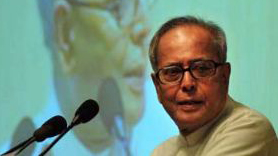 New Delhi, May 4: The Congress's dilemma over whether to sponsor Pranab Mukherjee in the race for Rashtrapati Bhavan was out in the open on Thursday when a party spokesperson hurriedly withdrew her comment about the veteran finance minister's indispensability for the government.
New Delhi, May 4: The Congress's dilemma over whether to sponsor Pranab Mukherjee in the race for Rashtrapati Bhavan was out in the open on Thursday when a party spokesperson hurriedly withdrew her comment about the veteran finance minister's indispensability for the government.The spokesperson, Renuka Chaudhary, kicked up a virtual storm when she told reporters, "It will never be easy to leave Pranabda. He is such a valuable person for us in the party. His contribution to the party cannot be even measured. For him, it will not seem to be fair but he has such an active political mind. He is too involved and knows politics so well."
A gushing Chaudhary went on to call Mukherjee a valuable guide, in what was almost universally interpreted as signalling the Congress's reluctance to spare its chief troubleshooter for a non-political sinecure.
The lavish commentary, however, was immediately rolled back, with Chaudhary taking pains to emphasize that her genuine expression of admiration for Mukherjee's skills had been misunderstood and twisted out of context.
When asked about the "confusion" over names doing the rounds, Congress chief Sonia Gandhi said, "There is no confusion. Have patience. There is still time." Although stating the obvious, the remark could have served to reassure that nobody has been ruled out yet as a candidate.
Chaudhary's retraction came amid indications of the finance minister's unhappiness over what he saw as an attempt to indulge him into withdrawing his claim for the top constitutional job.
Tired of being passed over for the prized trophies, starting from prime ministership to the stewardship of the home ministry, Mukherjee is learnt to have made it clear to the leadership that he would like to retreat to the sidelines rather than put up with career stagnation.
Sources said the finance minister reacted to Chaudhary's lavish prose by making it clear that he was not amused. "He saw it as an attempt to spoil his chances," acknowledged a senior Congress source.
Mukherjee is locked in a dead heat with Vice-President Hamid Ansari for Congress endorsement for Rashtrapati Bhavan.
The Congress has been unable to take a call. It is appreciative of Mukherjee's hurt as well as of the need to assuage it but the party fears that the departure of the UPA's principal firefighter will leave the government vulnerable. There are also worries that the prime minister, now at the fag end of a surprisingly long tenure and sure of not heading UPA-3, may start disengaging from Sonia Gandhi's political project just when the Congress chief is hoping for a fresh burst of energy before the 2014 polls.
The bind was underlined once again on Thursday evening when Sonia refrained from spelling out the party's choice when she discussed presidential elections with Trinamool boss and West Bengal chief minister Mamata Banerjee.
At the official Congress briefing, spokesman Rashid Alvi said he could not comment on candidates since the consultations were still underway but added that Renuka Chaudhary was correct in saying that "Mukherjee is important for party, parliament and government".





Comments
Add new comment